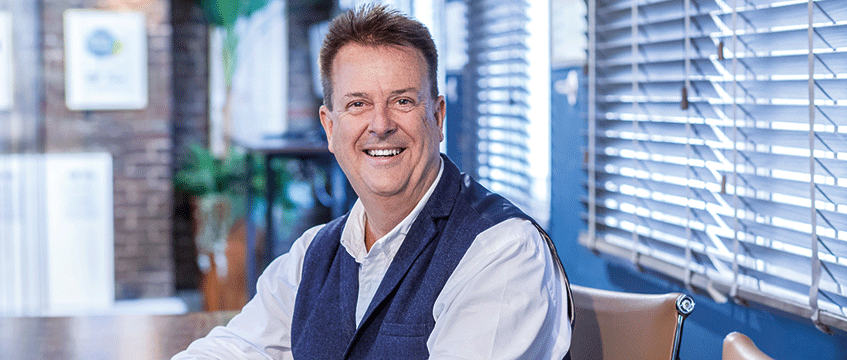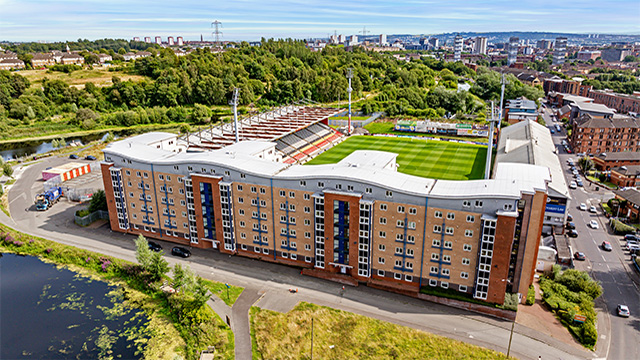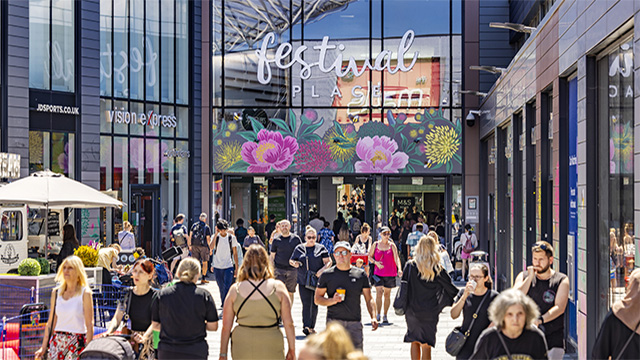Empiric boss on lessons learnt
Th e chief executive of Empiric Student Property, the £1.1bn listed student accommodation developer, says the company is basing its success on the “horizontal expansion” of its boutique-style developments.
Chief executive Duncan Garrood joined the business from a hospitality background in the thick of the Covid-19 pandemic. He says among the many “truths” he was educated on when joining the sector was that PBSA developers believe it is impossible to get the same operating margin for a small building as it is for a tower block. Empiric has proved this to be wrong by turning existing buildings such as offices and run-down hotels into an 8,000-bed PBSA portfolio.
The company, which floated in 2017, has a business model of developing 100-200-bed buildings across Russell Group university cities. It builds “clusters” and brings five or six sites together, driving amenity through one central building.
The chief executive of Empiric Student Property, the £1.1bn listed student accommodation developer, says the company is basing its success on the “horizontal expansion” of its boutique-style developments.
Chief executive Duncan Garrood joined the business from a hospitality background in the thick of the Covid-19 pandemic. He says among the many “truths” he was educated on when joining the sector was that PBSA developers believe it is impossible to get the same operating margin for a small building as it is for a tower block. Empiric has proved this to be wrong by turning existing buildings such as offices and run-down hotels into an 8,000-bed PBSA portfolio.
The company, which floated in 2017, has a business model of developing 100-200-bed buildings across Russell Group university cities. It builds “clusters” and brings five or six sites together, driving amenity through one central building.
Garrood says the business has not put a cap on how many buildings it can include in a cluster. “We don’t know what the upper limit is. We are at a slightly experimental stage of saying, ‘How many you can add?’” he says. “We will keep adding until we learn. If you take a city like Bristol as an example, three years ago we only had two buildings, and our margins were below 70%. Then we bought a building, we developed a building, and we have now bought another building that we are yet to develop and we see our margins now come up to over 80%.”
Adding more buildings means the company gets the advantage of the individual building but also “the benefit of the cluster growing and growing”.
“You see the whole thing growing,” Garrood adds. “We have seen the same in Edinburgh, where we again developed one and bought another. We call it horizontal efficiency, as opposed to a tower block, which is vertical efficiency.”
[caption id="attachment_1266940" align="aligncenter" width="847"] St Mary’s, Bristol[/caption]
Are we having fun yet?
Garrood’s background in running companies such as bowling operator Ten Entertainment Group and Bill’s Restaurants gives him a focus on service that has shaped his attitude to Empiric’s business.
“I’m not a pure property person, I’m not a developer and I’m not your average mould of property magnate,” he says. “I came into the business as an operating company. Fundamentally, what we do is have buildings designed for a customer to have an important experience at an important part of their life. The most important thing we can do is to make sure that experience is delivered in an exceptional way so that we continue to command the kind of rents we need for a premium business.
“That’s all about customer experience, not really all about buying and selling bricks and mortar. The board wanted somebody who was much more focused on service and generating earnings.”
Since joining the business, Garrood has disposed of 19 “non-core” assets with a combined 1,000 beds for £120m. That includes sites such as Emily Davies House, a 180-bed PBSA scheme in Southampton, sold to Singapore-listed property company Far East Orchard for £13.9m at a net initial yield of 5.7%. And there are more disposals to come.
“The focus in the past four years has been around transforming the portfolio,” he says. “Making sure we have consistency of quality across our estate, which, to be honest, there wasn’t previously.”
Garrood says Empiric has streamlined the cities it is prevalent in, with properties now across 20 key cities. It will reinvest the capital raised through the disposal of assets into growing its clusters.
Living the listed life
Empiric is also investing proceeds into raising the quality of its existing portfolio. The company raised more than £56m through new share sales earlier this year. It placed 59,686,950 new ordinary shares to raise £55.5m with investors, including its own directors. It also placed 663,714 shares in a RetailBook offer to secure a further £600,000.
The business’s share register includes European and US names. Garrood believes there is an increasing level of interest in this sector in Canada and the US. “It’s great to have that sort of cross-border perspective on how to best run a business,” he adds.
Public and private companies “have their pluses and minuses”, he says. “The one thing you can say about listed companies is that you spend a lot of time talking with investors and various stakeholders. From my point of view, I have a lot of external-facing work to do and a lot of communication.
“The great thing about spending time doing that [is] when you come to need capital, as we showed recently, you can go to that base of investors, and they will invest their trust in your plans and support you. The pity, I guess for us, is that we’re a little bit lonely in the listed sector – it’s just us and Unite.”
Empiric is looking to acquire value-add products and Garrood says its investors are “being patient” as the business works to improve its metrics. “We owe it to our shareholders to buy income-producing assets as soon as we can. That doesn’t mean we won’t do some development at some point, but not at the moment.”
[caption id="attachment_1266941" align="aligncenter" width="847"] Brunswick Apartments, Southampton[/caption]
Older and wiser
As any sector matures and evolves, business leaders have to ask the question, ‘What’s next?’. For Empiric, the business has decided segmentation is the way forward.
Empiric’s tenant base comprises 40% postgraduate students, and customer research found they don’t want to be housed with undergraduates.
“They have a slightly more mature view of life; they are very studious,” Garrood says. “They act much more like young professionals. They want larger space; they want to be equipped for dual occupancy if they’ve got a partner or are hopeful of getting one. They want things like a laundry capability in their room rather than a communal laundry. They want a bigger kitchen, big bathroom. What they don’t need is all the shared amenities that we provide in our main buildings.”
Empiric has identified 16 of its buildings that could be converted to provide such a postgraduate product. Garrood says the product is at the premium end of the market and comprises 80% studio apartments, making conversions easier.
International ambitions
While StuRents says international student numbers for the 2024/25 academic year fell, Garrood believes the long-term trend skews toward the opposite. For the current academic year, the sector saw a 0.5% decline in EU numbers, at 10,520 students, while 14,890 Chinese students (a 1.9% decline) and 4,770 Indian students (a 3.8% fall) were accepted.
“There’s been a temporary hiatus and that was caused by a couple of things,” Garrood says. “This year has been slightly unusual. There was the previous government’s reversal of the dependent visas issue for postgraduate students and that undoubtedly affected some. It didn’t affect our business at all as we don’t have that type of customer in there.
“There was undoubtedly some sentiment from the previous government that was not welcoming to international people. Then we had a change in government, and the message that this government has given to international students has been much more positive.”
He adds that the riots in the UK earlier this year, right at the time when students were deciding where to go, “were not helpful”. “There would be some parents in some parts of the world looking across at the UK and saying ‘This is not the year to send my kids to study there and therefore we’ll look somewhere else’,” he says. “That had some impact. So I think all of that together created shock and turbulence. But I don’t see that sustaining into the future at all, quite the opposite.”
Images © Claire Williams Photography/Studio Photography











